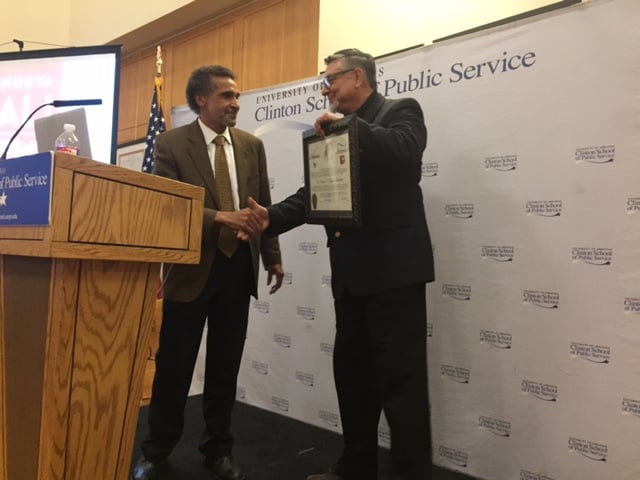UAMS Visitor Talks Latino Health Paradox and Cinco de Mayo
| March 24, 2017 | A couple of common misconceptions about Hispanics were highlighted in talks by David E. Hayes-Bautista, Ph.D., who visited UAMS and the Clinton School of Public Service last week.
Hayes-Bautista, a distinguished professor of medicine from the University of California, Los Angeles, noted that Latinos are often incorrectly lumped with other minorities when health disparities are discussed.

David E. Hayes-Bautista, Ph.D., explains the historic significance of Cinco de Mayo in the United States.
Like other minorities, Hispanics have the commonly cited risk factors of lower income, low education and low access to health care. And yet, for many conditions, the health of Hispanics is just as good as whites and in some cases better. For example, Hispanics in the United States have a 30 percent lower rate of heart disease – the leading cause of death – than whites.
“Whoa, lower?” Hayes-Bautista asked during a presentation to UAMS faculty. “Shouldn’t it be higher?”
The same is true for cancer, the second leading cause of death. Hispanics nationally have a nearly 40 percent lower rate of cancer deaths than whites. In Arkansas, Hispanics have a 70 percent lower death rate from cancer.
Hayes-Bautista said Hispanics/Latinos bring healthy behaviors from their native countries. For example, the smoking rate among Hispanics is about half that of whites in Arkansas. But those good behaviors are weakened in their U.S.-born children, who have higher rates of poor health behaviors.
For more than three decades he has studied the “Latino Epidemiological Paradox,” the tendency of Latino Americans to have health outcomes comparable to or better than their non-Hispanic white counterparts in the United States, and the implications of this paradox for populations, chronic diseases and communicable diseases.
Hayes-Bautista’s study of Hispanic culture and history led him to write the book El Cinco de Mayo: An American Tradition, a topic he presented at the Clinton School. The public event and reception was sponsored by the UAMS Translational Research Institute and the UAMS Center for Diversity Affairs, as well as the Clinton School.

David E. Hayes-Bautista, Ph.D., (center, back), with (l-r) the UAMS Translational Research Institute’s Pam Christie, Amy Jo Jenkins, Teresa Broady, Sandra Hatley, Michael Bailey, Robbie Hunt and Beatrice Boateng, Ph.D.
Cinco de Mayo marks the Mexican military victory over the invading French army on May 5, 1862, but it’s more widely celebrated in the United States than in Mexico. The victory, he explained, prevented an alliance that would have benefited the Confederacy. Hispanics were against slavery and sided with the Union. The May 5 victory was the turning point in France’s attempt to create a monarchy over Mexico that would ally with the Confederacy. For U.S. Latinos from Mexico, the victory became a rallying cry for the Union.
In 1996, Cinco de Mayo got a U.S. postage stamp, and in 2005 it became an annual celebration in the White House and is now recognized widely across the country.
“If you ask these millions of people why are we celebrating, nobody knows. It’s just a party for some,” Hayes-Bautista said.
His UAMS talks are available at http://bit.ly/2nk4wMI (hosted by Peds Place) and http://bit.ly/2nPG5YW (hosted by College of Pharmacy).
His talk at the Clinton School will be available soon at: http://www.clintonschoolspeakers.com.
Hayes-Bautista is also director of the Center for the Study of Latino Health and Culture at the UCLA David Geffen School of Medicine. For the past five years, he has been chosen one of the 101 Top Leaders of the Latino Community in the U.S. by Latino Leaders Magazine. In 2012, he received the Association of American Medical Colleges Herbert W. Nickens Award for his lifelong concerns about the educational, societal and health care needs of underrepresented groups.
Hayes-Bautista has written or edited nine books on Latino health and culture and is a frequent contributor of opinion pieces to major newspapers. He has published articles in journals ranging from Academic Medicine to Salud Pública de México. He has authored dozens of proposals for funded research projects, and has given hundreds of presentations to medical and lay communities and to government agencies concerned with the nation’s health care system. Some of his center’s research on the emergence of the Latino population and society in California during the Spanish colonial, Mexican Republic, and U.S. statehood periods appears in his recent book, El Cinco de Mayo: An American Tradition (U.C. Press, 2012).
Other co-sponsors of his two-day visit were the UAMS College of Pharmacy, Arkansas Center for Health Disparities in the UAMS Fay W. Boozman College of Public Health, League of United Latin American Citizens, and the Joel E. Anderson Institute on Race and Ethnicity at the University of Arkansas at Little Rock.
